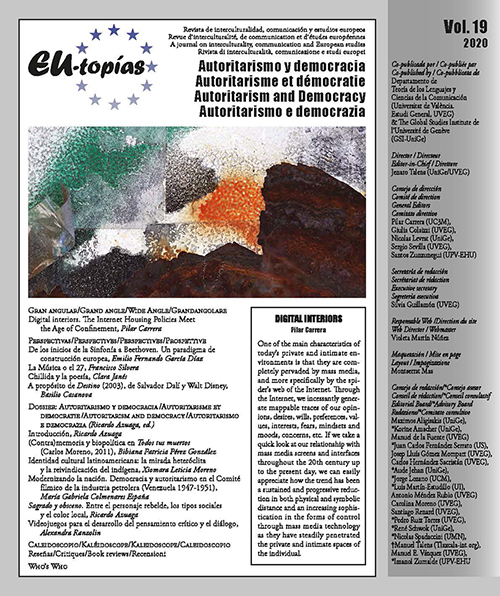Video games for the development of critical thinking and dialogue
DOI:
https://doi.org/10.7203/eutopias.19.17878Keywords:
Constructivism, media education, critical thinking, video games, generation Z Abstract
Abstract
This article takes up the results of the research carried out by the author of other article entitled Video games in the classroom: a proposal associated with the development of critical thinking (2016). Some of the concerns generated in the study are related to the guidelines for developing a proposal for the use of video games in the classroom, associated with the development of critical thinking, in a group of young Venezuelans in school between the ages of 13 and 17. We tried to understand video games as a cultural product in the Venezuelan context, the habits of video game consumption by the subjects studied and their relationship with critical thinking and the development of dialogue processes. The starting point is the analysis of the four dimensions proposed by Lipman (1998) for the study of critical thinking and the sociocultural conception of learning and the theory of Vigotsky’s Zone of Proximal Development. From the methodological point of view, the interview was used as a technique for data collection and work was done with an intentional sample, made up of two 14-year-old adolescents, who interacted with video games of different genres. It was observed that dialogue and collaboration in the face of these technologies are spontaneous and necessary behaviors to favor problem solving and decision making; thus, the guidelines proposed by Lipman and Vigotsky are formulations that allow for orienting reflections on the possibilities that media literacy can offer for the development of critical views on the media.
 Downloads
Downloads
 References
References
Boisvert, Jacques. La formación del pensamiento crítico: Teoría y práctica. México: Fondo de Cultura Económica, 2004.
Carrera, Beatriz y Clemen Mazzarella. «Vygotsky: enfoque sociocultural». Educere, 5(13), 2001, pp. 41-44. Recuperado de http://www.redalyc.org/articulo.oa?id=35601309.
CEPAL. Estado de la banda ancha en América Latina y el Caribe 2016. Santiago: Naciones Unidas, 2016.
Frasca, Gonzalo. «Gonzalo Frasca, el uruguayo que diseña videojuegos con los que enseñan matemáticas en Finlandia». Elige educar, 2018. Recuperado el 25 de enero de 2018 de http://www.eligeeducar.cl/gonzalo-frasca-uruguayo-disena-videojuegos-los-ensenan-matematicas-finlandia.
Ferrés, Joan. Educación y Televisión. Barcelona: Paidós, 1994.
Gee, James Paul. What Video Games Have to Teach Us About Learning and Literacy. EEUU: Macmillan, 2014.
Gómez-García, Salvador, Antonio José Planells de la Maza y Mar Chicharro-Merayo. «¿Los alumnos quieren aprender con videojuegos? Lo que opinan sus usuarios del potencial educativo de este medio». Educar, 2017. Recuperado de http://www.raco.cat/index.php/Educar/article/view/317270.
Hernández, Gustavo. «Introducción a la teoría de la educación para los medios». Anuario Ininco. Investigaciones de la Comunicación, 13(1), 2001. Recuperado de http://www.bantaba.ehu.es/formarse/ficheros/view/Introducci%F3n_a_la_Teoria_de_la_Educaci%F3n_para_los_medios.pdf?revision_id=56379&package_id=56305.
Huizinga, Johan. Homo Ludens. Madrid: Alianza, 2007.
Lipman, Matthew. Pensamiento complejo y educación. Madrid: Ediciones de la Torre, 1998.
Martín-Barbero, Jesús. De los medios a las mediaciones. Barcelona: Editorial Gustavo Gili, 1987.
Masterman, Len. La enseñanza de los medios de comunicación. Madrid: Ediciones de La Torre, 1993.
Orozco, Guillermo. «Medios, audiencias y mediaciones».Comunicar, 8, 1997. Recuperado de: http://www2.uned.es/ntedu/espanol/master/primero/modulos/teoria-de-la-informacion-y-comunicacion-audiovisual/orozco.pdf.
— Educomunicación 2.0. UNED Entrevistas, 2012. Recuperado de: https://www.youtube.com/watch?v=JD8Di8qyv6g.
Ortega, Iñaki. Generación Z. El último salto generacional. Resumen ejecutivo. Bilbao: Universidad de Deusto, Atrevia, 2016.
Pasquali, Antonio. Comprender la comunicación. Caracas: Monte Ávila Latinoamericana C.A., 1990.
Pastor, José Luis. «Aprendizaje social y nuevas formas de entender el proceso de enseñanza-aprendizaje». Padres y maestros, 351, 2013. Recuperado de http://revistas.upcomillas.es/index.php/padresymaestros/article/view/1045/889.
Peláez, Bruno. «Videojuegos: Una aproximación». Comunicología: Indicios y Conjeturas. México: Universidad Iberoamericana Ciudad de México, 2006.
Ranzolin, Alexandra. Videojuegos en el aula: Una propuesta asociada al desarrollo del pensamiento crítico. Caracas: Universidad Central de Venezuela, 2016.
Downloads
Published
How to Cite
-
Abstract928
-
PDF (Español)470
Issue
Section
License
The authors conserve the copyright. All content published in EU-topías. Journal of interculturality, Communication, and European Studies are subject to the license Creative Commons Attribution-NonCommercial-ShareAlike 4.0 license. The full text of the license can be found at <http://creativecommons.org/licenses/by-nc-sa/4.0>
They may be copied, used, disseminated, transmitted and publicly displayed, provided that:
- The authorship and original source of the publication is cited (journal, publisher and URL of the work).
- They are not used for commercial purposes.
- The existence and specifications of this license of use are mentioned.
It is the responsibility of the authors to obtain the necessary permissions for images that are subject to copyright.



